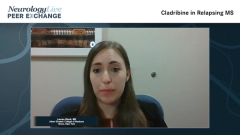
Platform Agents for MS: Interferons and Glatiramer
Fred D. Lublin, MD, Ravi Dukkipati, MD, and Lauren Gluck, MD, discuss interferons and glatiramer as platform therapies in multiple sclerosis.
Episodes in this series

Fred D. Lublin, MD: Let’s move on to looking at specific agents. I am going to start with what have been called “the platform agents.” I don’t like that term. I don’t know what it means, but that’s interferon [cytokine] and glatiramer acetate [immunomodulators]. I took this 1 because I have the gray hair and it was around in 1993 when we had our first approval of interferon beta-1b and the study that we performed to do that. That sort of changed everything in terms of landscape for multiple sclerosis [MS] since it went from 1 drug to now over 20 drugs. But the platforms, or interferon which have several varieties—beta 1b or beta 1a in sub-Q [subcutaneous] injection and IM [intramuscular] injection—in varying dosing schedules, and glatiramer acetate. I am not going to say much about the mechanism of action because even though they have been around since the mid-1990s, we don’t know what the mechanism of action is—certainly not for glatiramer acetate. Interferon is interesting because it’s a whole host of things. It’s become more interesting in the last year because type II interferons [type II IFN] and type I interferons [type I IFN] are part of the innate immune system and are involved in how you fight off novel infections such as COVID-19. We have seen some interesting results in terms of patients who want interferons in COVID-19, but that’s for another day. The main thing we’ve learned over this period is that they are modestly effective, but some people do very well on them. I have patients who have been on either interferon or glatiramer acetate since the 1990s. They’re still on them because they’ve done well and they don’t want to change. They tolerate giving themselves the injection. They feel great and do well. The other important aspect of these 2 agents is that they are extremely safe, especially glatiramer acetate. They don’t require monitoring. They don’t interact with anything else. And they don’t broadly immune-suppress. It’s very uncommon that we will prescribe an interferon at this point in time. I’ll be interested in your thoughts on this. We have some new prescriptions for glatiramer acetate. When a patient comes in, we start the conversation about a therapy. They all say 1 of 3 things: “What’s the safest drug you have? I am concerned about what I put in my body. How long has that drug been around?” There is a whole group of individuals whose safety is their number 1 concern, as opposed to another group where efficacy is the main concern. For those people who say, “I am going to take a supplement that is really safe,” we start them on glatiramer acetate. I’ll throw that out to the rest of you and see what your thoughts are on these agents.
Ravi Dukkipati, MD: To your point Dr. Lublin, the interferons and glatiramer acetate hold a significant place in terms of the history of MS treatment. Their role is not as prominent as it once was, but they still have a role albeit. I think they are not used as frequently as first-line agents as they once were. That’s because the newer options have better profiles overall in terms of mode of delivery, efficacy, and adherence by virtue of those 2 points. We still have a handful of patients on glatiramer acetate at WellSpan Medical Group in York, Pennsylvania. We also have a handful of patients on interferon for the very reasons you mentioned. They are important, just not as prominent as they once were.
Fred D. Lublin, MD: Lauren.
Lauren Gluck, MD: I don’t prescribe these as new agents or transition agents a lot. Regarding glatiramer acetate, I have the rare patient with so many comorbidities or other pre-existing conditions where glatiramer acetate is the safest option that I know. I am not going to do more harm than good. But 1 of the issues I have with my patients who have been on interferons and glatiramer acetate for a long time—a lot of them do very well if they are in their 60s or 70s—is those who have had several clinical or imaging relapses feel very anchored to these drugs, come in with exactly what you had mentioned. But these are the safest ones. And I sometimes have to flip the script and say, “Yes, the adverse effects of these medicines are low right now, but the adverse effect of you having more MS activity later on is often quite high.” I try to have very firm conversations with certain patients about that. Even though you have been on this medicine for a long time, for some people, it’s not enough. Weighing the risk of more MS disability versus the potential for an infection, or more blood work monitoring, has to be considered.
Fred D. Lublin, MD: Thank you all for watching this Neurology Live® Peer Exchange™. If you enjoyed the content, please subscribe to our e-newsletters to receive upcoming peer exchanges and other great content right in your inbox. Thank you for joining us.
Transcript Edited for Clarity
Newsletter
Keep your finger on the pulse of neurology—subscribe to NeurologyLive for expert interviews, new data, and breakthrough treatment updates.
























